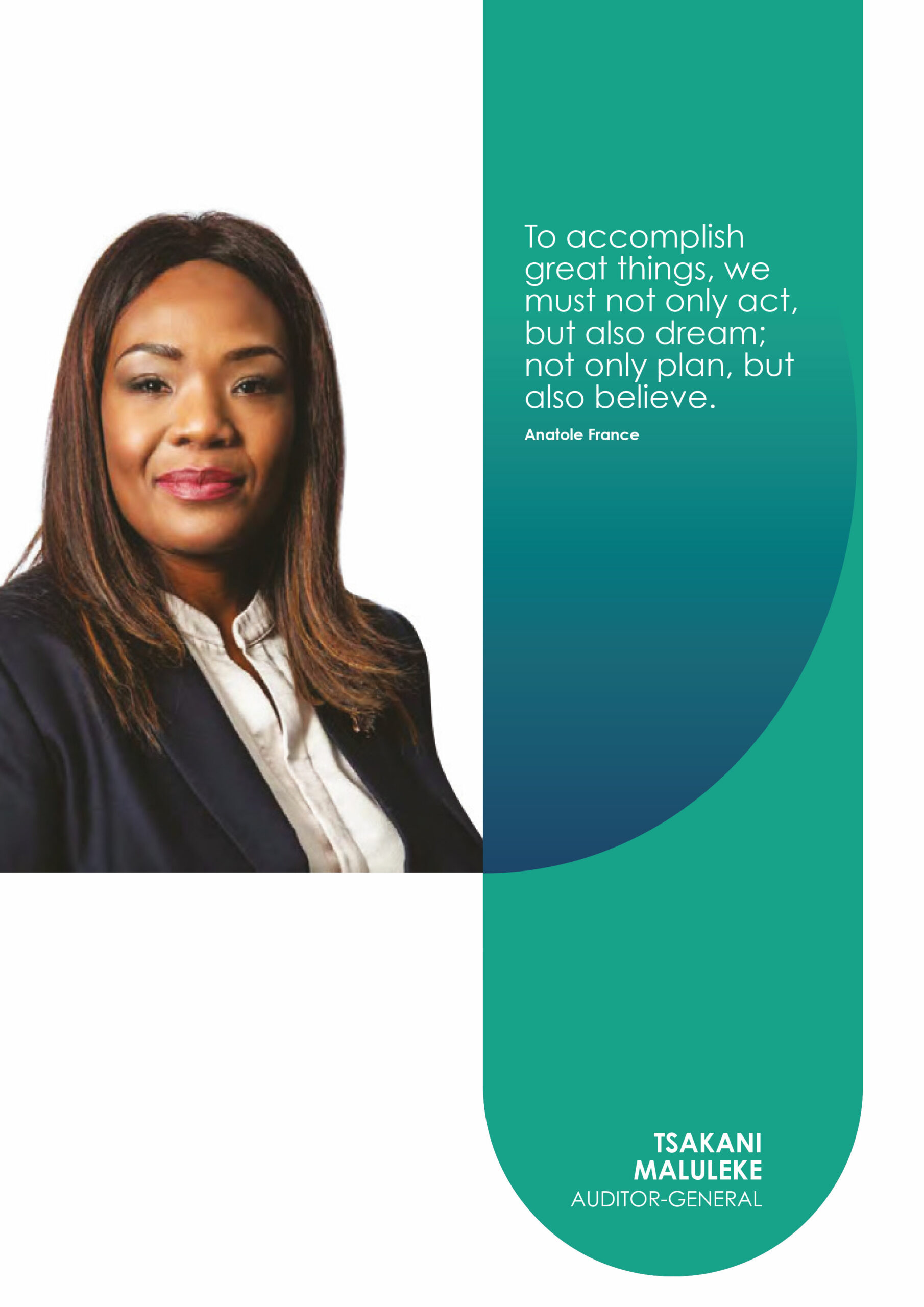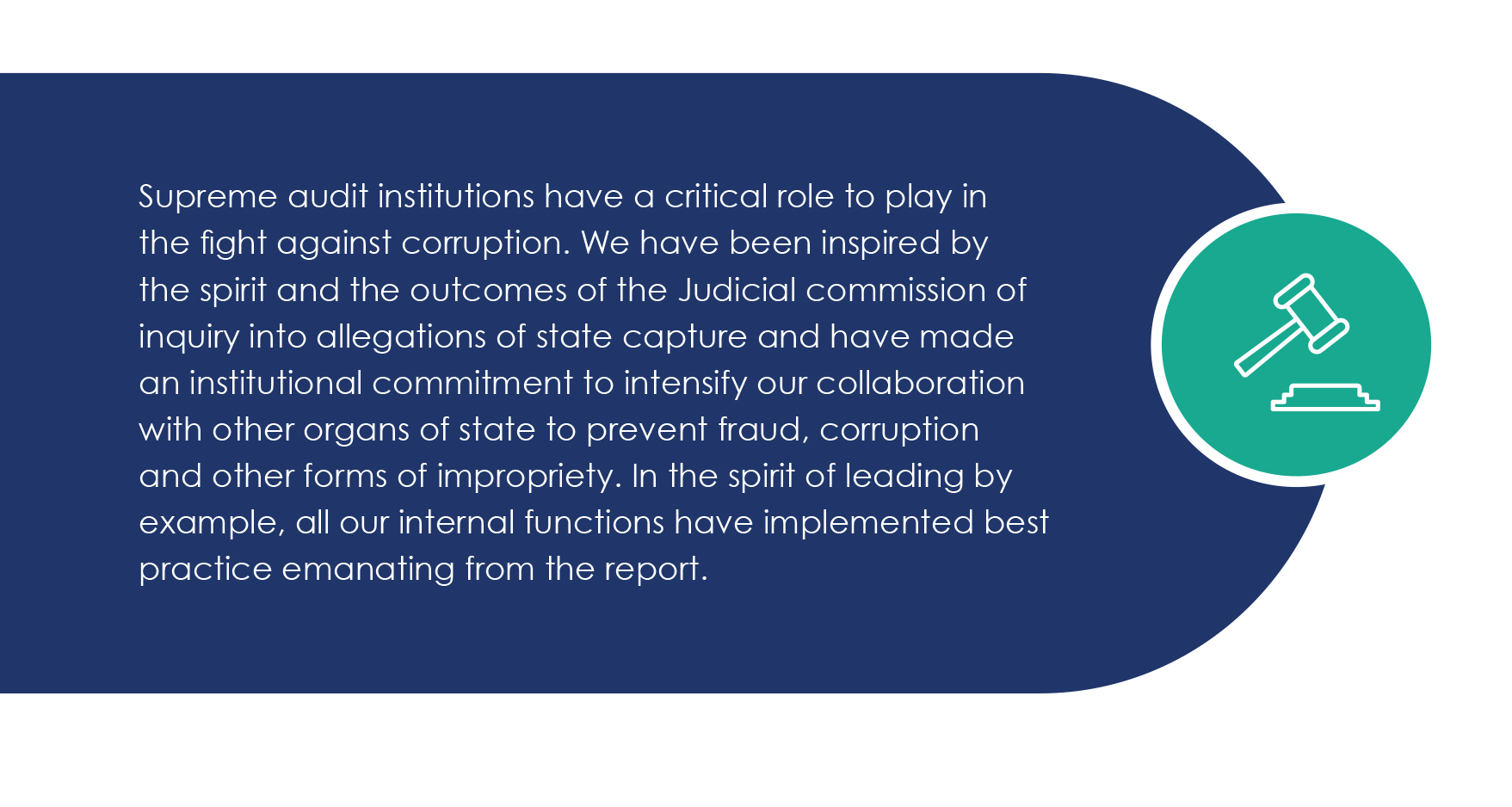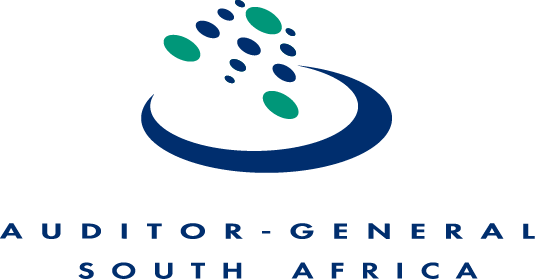






AUDITOR-GENERAL’S MESSAGE
In these times of digital transformation, machine learning, artificial intelligence and large language models, the work in the national audit office requires certain fundamental traits such as diligence, tenacity, quality of work, integrity, and some non-traditional elements such as the ability to dream.
We dared to dream; to transform our environment and imagine a South Africa in which her people trust the integrity of their government, appreciate the accountability and transparency with which public resources are managed and, ultimately, enjoy access to basic service delivery.
To realise the dream, we needed action. We planned our end goal, assessed our environment against the end goal and applied the insight gained to tailor programmes that create value for our stakeholders. I firmly believe that our work positively impacts achieving the ambitions of our country’s National Development Plan and supports the improvement of the lives of the people of South Africa.
An important driver of the state’s capability to deliver services is the quality and strength of a public service culture and the values embedded within it particularly those of performance, accountability, transparency and integrity. This premise forms the foundation of our #cultureshift2030 strategy, developed in 2021.
During the 2022-23 reporting period, while executing our mandate, we focused on building the skills, capacity and capabilities required for us to successfully deliver our #cultureshift2030 strategy.
Accountability ecosystem
The strategy encompasses creating an accountability ecosystem. We formally outlined the concept as a network of all the roleplayers that have a mandate or responsibility to drive public sector accountability.
We actively encourage each roleplayer to leverage on their mutually reinforcing connections to help shift the culture within the public sector to one of active performance, accountability, transparency and integrity.
We highlighted the strategic connections between the citizen’s service delivery expectations, the mandates of the various responsible players in government and society, and the available accountability mechanisms. We also highlighted their effectiveness in driving transparent, responsive and prudent public financial management aimed at improving the wellbeing of South Africans, as embedded in our Constitution.
I believe that regular and prudent collaboration, information sharing and contributions throughout the accountability ecosystem will lead to a shift in public sector culture. This positive influence could result in effective service delivery that will help better the lives of the people of South Africa.
To monitor the integrity of our accountability ecosystem, we will also assess the network and contributors annually. This evaluation will become an integral part of the value we deliver to our stakeholders.
How we added value through our work
The rigorous scrutiny of the accounting records and other related information to support financial statements and performance reports of approximately 1 000 institutions that we audited resulted in two general reports being tabled in Parliament. These serve as a state-of-governance account of how our government – at all three tiers – has spent taxpayers’ money during the audited period, provide a comprehensive analysis of the audit outcomes and represent the main source of insight into the stewardship of public funds in the country. This year, our general reports went further to include a particular focus on service delivery.
Along with our key recommendations and government’s commitments, the insight into the impact of these results is meant to stimulate understanding and encourage a shift to a culture of accountability.
The insight garnered from the real-time audit on the use of the funds allocated for relief of damages caused by the floods in KwaZulu-Natal and the Eastern Cape elicited an acknowledgement by government that it was ill-prepared to manage disasters. Extensive interactions with all our stakeholders gave our reports the necessary attention and influence to compel action.
Government made commitments that included stopping irregular contracts, withholding payments to suppliers until the work was completed, negotiating prices and applying other measures to minimise leakage and maximise the use of public funds on actual disaster relief for the people affected by the floods. We monitor these commitments on an ongoing basis.
Our relevant and actionable insight also focused on specific areas of public spending, especially those that make up the bulk of the budget and have the power to bring improvement in the lives of ordinary South Africans.
We issued a performance audit report on the rehabilitation of derelict and ownerless mines, which highlighted the health and safety concerns for local communities that live around these mines. The strength of our messages increased with the application of targeted data analytics. We tested new tools that enabled us to analyse vast volumes of data for greater efficiency.
We continued to enable oversight by sharing the audit outcomes and providing rich insight to drive understanding and action, and are particularly pleased to observe that our investment in enhancing the capabilities of portfolio committees and committee support staff is yielding positive results.
Implementing our extended powers
In 2022-23 we reached our target to implement our material irregularity process at 202 public sector institutions that we audit in national and provincial government, and 170 in local government. We are on track to implement this process at all 879 institutions that we audit in the 2024-25 financial year.
So far, the material irregularity process prevented R655 million in financial loss, while R164 million was recovered with a further R820 million in the process of recovery. Importantly, the process also ushered in a change that saw internal controls improve, supplier contracts being stopped where money was being lost, and consequences for wrongdoing. At the same time, we enhanced our material irregularity methodology and guidance to streamline the process and strengthened our collaboration and relationships with public bodies such as the Special Investigating Unit and the Office of the Public Protector. Special material irregularity reports provided full transparency of the resolution status of the material irregularities for national, provincial and local government.
Our main challenges
An important pillar of our independence is our financial viability. Throughout the years it has been sustained by sound financial administration, strict cash flow management and good internal controls, systems and processes. However, our work and our viability is dependent on the overall status of the fiscus.
The persistent lack of prudence in spending, inadequate financial management and inadequate accountability for financial performance erode the limited public funds available, and the scope for beneficial spending on service delivery is severely limited.
The increased number of auditees in financial distress is compounded by the rise in the public’s demands for service delivery and accountability, protests and destruction of public assets. This makes it imperative that accounting officers and authorities do everything in their power to get the most value from every rand spent and to manage every aspect of their finances with diligence and care.
One of the consequences is that auditees impacted by the status of their public finances are unable to pay audit fees, which in turn threatens our sustainability. Debt owed to us is ever increasing, which restricts our plans to modernise our tools and develop our staff. Our leadership pays constant attention to this challenge.
Over the past year, we have dealt with litigation brought against us in relation to our audit work and related reports.
Pushbacks and litigation often compromise our ability to meet our legislated deadlines and cause us to deploy scarce resources towards legal fees.
These challenges to our work present opportunities for key roleplayers in the accountability ecosystem to not only participate in resolving disputes, but to actively shift towards a culture of responsible public financial management, effective performance, greater transparency and better accountability.
We have revised our audit dispute resolution mechanism, which is succinct and allows for greater leadership visibility through a tiered escalation approach. Ultimately, our desire is that the new process will significantly reduce the appetite to litigate against our audit outcomes. While it is too soon to express a conclusive view on the effectiveness of the revised dispute resolution mechanism, I am encouraged by the early signs that it may promote a more constructive engagement with those who raise disputes.
Our year of transition also presented a unique performance challenge. In our ambition to build a strong basis for our #cultureshift2030 strategy, we defined a set of internal targets to develop the requisite knowledge, skills, capacity and tools. While we achieved the commitments outlined in our strategic plan, we fell short of achieving some important internal milestones. We are determined to erase this shortfall in performance and proceed with implementing the strategy in the identified value chains and sectors.
Future audit focus
While individual audit plans have always been in place, we have begun to align our audits with a comprehensive long-term strategic audit plan to ensure that our audit messages and insight are consistent, relevant and wide-ranging, and have impact.
The long-term approach will also demonstrate the transparency of our choices, the allocation of limited organisational resources to auditing what matters and the expected impact on service delivery as the vehicle to improve people’s lives.
We will strengthen our specialist expertise, deepen our insight in selected fields, and fine-tune our audit messages and recommendations to increase our impact on the improvement of audit outcomes and, consequently, on improving people’s lived realities.
Conclusion
In daring to dream, we shifted our own culture, realising that our work cannot be done in isolation. To succeed in transforming our environment, we must collaborate in an accountability ecosystem with common purpose for the benefit and wellbeing of our people.
We call on all relevant stakeholders to share our dream and join us on the journey towards a better South Africa.

